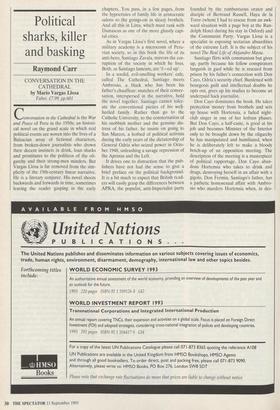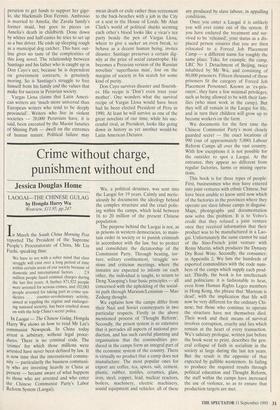Political sharks, killer and basking
Raymond Carr
CONVERSATION IN THE CATHEDRAL Conversation in the Cathedral is the War and Peace of Peru in the 1950s: an histori- cal novel on the grand scale in which real political events are woven into the lives of a Balzacian array of fictional characters, from broken-down journalists who drown their decent instincts in drink, loan sharks and prostitutes to the politicos of the oli- garchy and their strong-men minders. But Vargas Llosa is far removed from the sim- plicity of the 19th-century linear narrative. He is a literary conjurer. His novel shoots backwards and forwards in time, sometimes leaving the reader gasping in the early
chapters. You pass, in a few pages, from the hypocrisies of family life in aristocratic salons to the goings-on in sleazy brothels. And all this in Lima, which must rank with Damascus as one of the more ghastly capi- tal cities.
As in Vargas Llosa's first novel, where a military academy is a microcosm of Peru- vian society, so in this book the life of its anti-hero, Santiago Zavala, mirrors the cor- ruption of the society in which he lives. Both, as Santiago laments, are `f—ed up'.
In a sordid, evil-smelling workers' cafe, called The Cathedral, Santiago meets Ambrosio, a black, who has been his father's chauffeur: snatches of their conver- sation, interspersed in the narrative, hold the novel together. Santiago cannot toler- ate the conventional pieties of his well- heeled family. Rather than go to the Catholic University, to the consternation of his snobbish mother and the genuine dis- tress of his father, he insists on going to San Marcos, a hotbed of political activists during the early years of the dictatorship of General Odria who seized power in Octo- ber 1948, unleashing a savage repression of the Apristas and the Left.
It drives one to distraction that the pub- lishers have not had the sense to give a brief preface on the political background. It is a bit much to expect that British read- ers will easily grasp the differences between APRA, the populist, anti-Imperialist party founded by the rumbustuous orator and disciple of Bertrand Russell, Haya de la Torre (whom I had to rescue from an awk- ward situation with a page boy at the Ran- dolph Hotel during his stay in Oxford) and the Communist Party. Vargas Llosa is a specialist in exposing sectarian absurdities of the extreme Left. It is the subject of his novel The Real Life of Alejandro Mayta.
Santiago flirts with communism but gives up, partly because his fellow conspirators languish in gaol while he is rescued from prison by his father's connection with Don Cayo, Odria's security chief. Burdened with bourgeois guilt and intellectual doubts he opts out, gives up his studies to become an underpaid hack journalist.
Don Cayo dominates the book. He takes protection money from brothels and sets up house with Hortensia, a faded night- club singer in one of her lesbian phases. But Don Cayo, a half-caste, is good at his job and becomes Minister of the Interior only to be brought down by the oligarchy he has manipulated and humiliated, when he is deliberately left to make a bloody botch-up of an opposition meeting. The description of the meeting is a masterpiece of political rapportage. Don Cayo aban- dons Hortensia who takes to drink and drugs, destroying herself in an affair with a gigolo. Don Fermin, Santiago's father, has a pathetic homosexual affair with Ambro- sio who murders Hortensia when, in des- peration to get funds to support her gigo- lo, she blackmails Don Fermin. Ambrosio is married to Amelia, the Zavala family's former maid, but goes to pieces on Amelia's death in childbirth. Done down by whites and half-castes he tries to set up as a bus driver. He ends up sleeping rough as a municipal dog catcher. This bare out- line gives no taste of the complexities of this long novel. The relationship between Santiago and his father who is caught up in Don Cayo's net, because he is dependent on government contracts, is genuinely moving. So is Santiago's struggle to free himself from his family and the values that make for success in Peruvian society.
Vargas Llosa claims that Latin Ameri- can writers are 'much more universal than European writers who tend to be deeply provincial'. Writers who live in violent societies — 20,000 Peruvians have, it is said, been executed by the Maoist fanatics of Shining Path — dwell on the extremes of human nature. Political failure may mean death or exile rather than retirement to the back-benches with a job in the City or a seat in the House of Lords. Mr Alan Clark's world of political sharks scenting each other's blood looks like a vicar's tea party beside the pen of Vargas Llosa, where to give a sucker an even break, to behave as a decent human being, invites disaster. Santiago preserves a certain dig- nity at the price of social catastrophe. He becomes a Peruvian version of the Russian novelists' superfluous man', lost on the margins of society in his search for some kind of purity.
Don Cayo survives disaster and flourish- es. His recipe is 'Don't even trust your mother'. One wonders what the survival recipe of Vargas Llosa would have been had he been elected President of Peru in 1990. At least he will survive as one of the great novelists of our time, while his suc- cessful rival, as President, looks like going down in history as yet another would-be Latin American Dictator.



















































 Previous page
Previous page